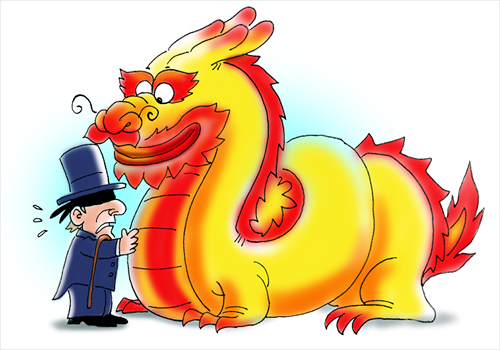Note to Europe: Don’t underestimate China

Illustration: Liu Rui/GT
There is no doubt that China is becoming an increasingly influential actor in Europe. No doubt, at least, as far as many politicians, experts and scholars are concerned.
However, it seems that large portions of the general public in European countries are still largely ignorant of what is happening in the sphere of Sino-European relations. They are also blithely unaware of the three-dimensional reality of modern China. Why exactly is this?
There are a variety of reasons. Foremost among these is the rather incomplete and inadequate coverage of China's involvement in Europe by the mainstream media.
For instance, China's "One Belt, One Road" project to create a transport and trade network to comprehensively link Europe and East Asia is sadly unknown to most Europeans. Similarly, people are unaware of China's investment of billions of euros in Central and Eastern Europe. This is because, on the whole, European media do not cover these supposedly "uninteresting" developments.
This brings us to a second problem with European media reporting on China. The fact is that for the most part media coverage consists of constant recycling of the same tropes.
Some scholars note that the British media constantly emphasize negative aspects of China's development while neglecting to mention the positive aspects. Human rights issues and the dumping of cheap steel were mentioned in almost every report about China during Chinese President Xi Jinping's state visit, while the good aspects brought by the large scale of cooperation projects were barely mentioned.
European media also frequently present stories about the supposed proliferation of sweatshops and factories paying low wages and abusing workers' rights. While such concerns are to a great extent legitimate, the tendency of Western media to dwell on such stories only serves to confirm the stereotype, widespread in Europe, of a China which is packed to overflowing with unfortunate wage-slaves.
A recent article in the UK's The Guardian, for instance, claimed (without any attempt at irony) that Chinese workers are "indentured slaves." It went on to suggest that failing to turn up to work in China "may get you killed." Such recycling of tired and inaccurate stereotypes in a newspaper which is supposed to be among the ranks of Britain's quality publications rather than a tabloid is hardly conducive to promoting understanding among Europeans of the reality of contemporary China.
Stereotypes of China and Chinese people therefore persist. Many Europeans with whom I have discussed China tend to dismiss it as a place where poor quality goods are produced in large quantities. The unspoken assumption is often that there is no way that China could produce anything of quality.
Europeans forget that Japan, now regarded as the home of high-tech, also had to transition through a phase of producing low quality products in high volumes before it managed to reach developed nation status, and that China, home to a far larger population, is actually transitioning at least as fast as Japan did.
China is also, in a frequently-mentioned European stereotype, a land of copyright-infringers and rip-off merchants. Everything is copied, nothing is original. Thus the considerable achievements of a Nobel laureate such as Tu Youyou or an innovative entrepreneur such as Alibaba's Jack Ma tend to be forgotten or regarded as an anomaly rather than indicative of the potential of a country which is still working through its development process.
In a book on the emergence of Alibaba, Porter Erisman, who worked at the company for eight years, comments that the "running narrative about tech entrepreneurs in China," which claims that "the Chinese are great imitators but not great innovators," is simply untrue.
Erisman states that although "some sectors in China's economy are led by imitators," he found his "colleagues and industry peers in China to be even more entrepreneurial than our counterparts in Silicon Valley." In other words, Chinese people are capable of at least as much innovation as Westerners, if not more.
Overall, because of entrenched stereotypes and media misrepresentation, Europeans drastically underestimate China and the Chinese. They do not see an emerging power which is capable of being a global leader, but a nation of drones and plagiarists which needs to be taught how to think and behave properly by its European elder brother.
Of course this is partly the result of China's failure to communicate clearly. China has not yet established sufficient soft power in Europe to be able to persuade Europeans of the merits of its initiatives. This situation urgently needs to be corrected.
It is high time that Europeans themselves, particularly those in the media, woke up to the reality of a China which is becoming steadily more responsible and proactive, instead of assuming that old tropes and stereotypes represent the whole truth about modern China.
The author is lecturer in International Relations, Jan Masaryk Centre for International Studies, University of Economics in Prague. opinion@globaltimes.com.cn